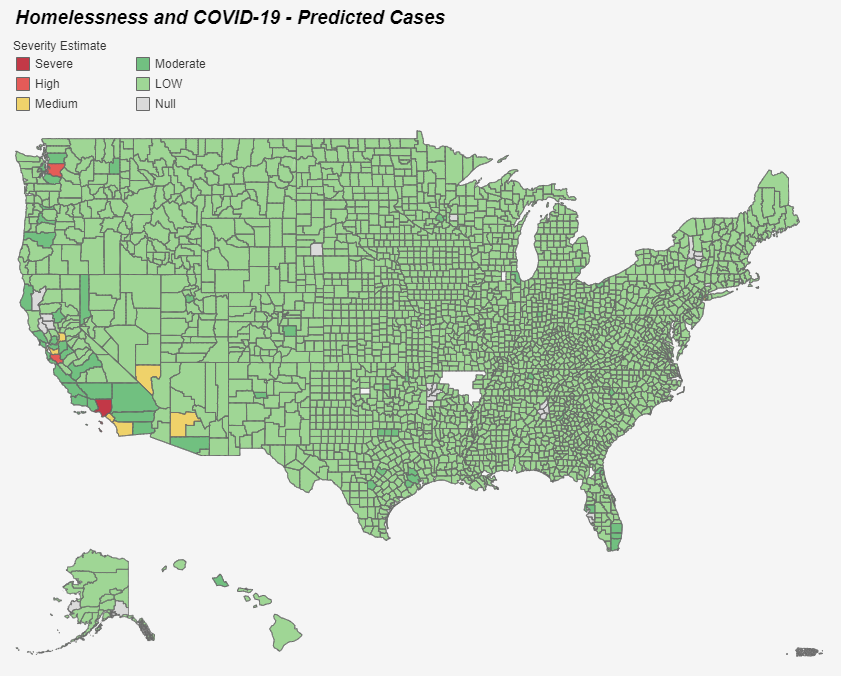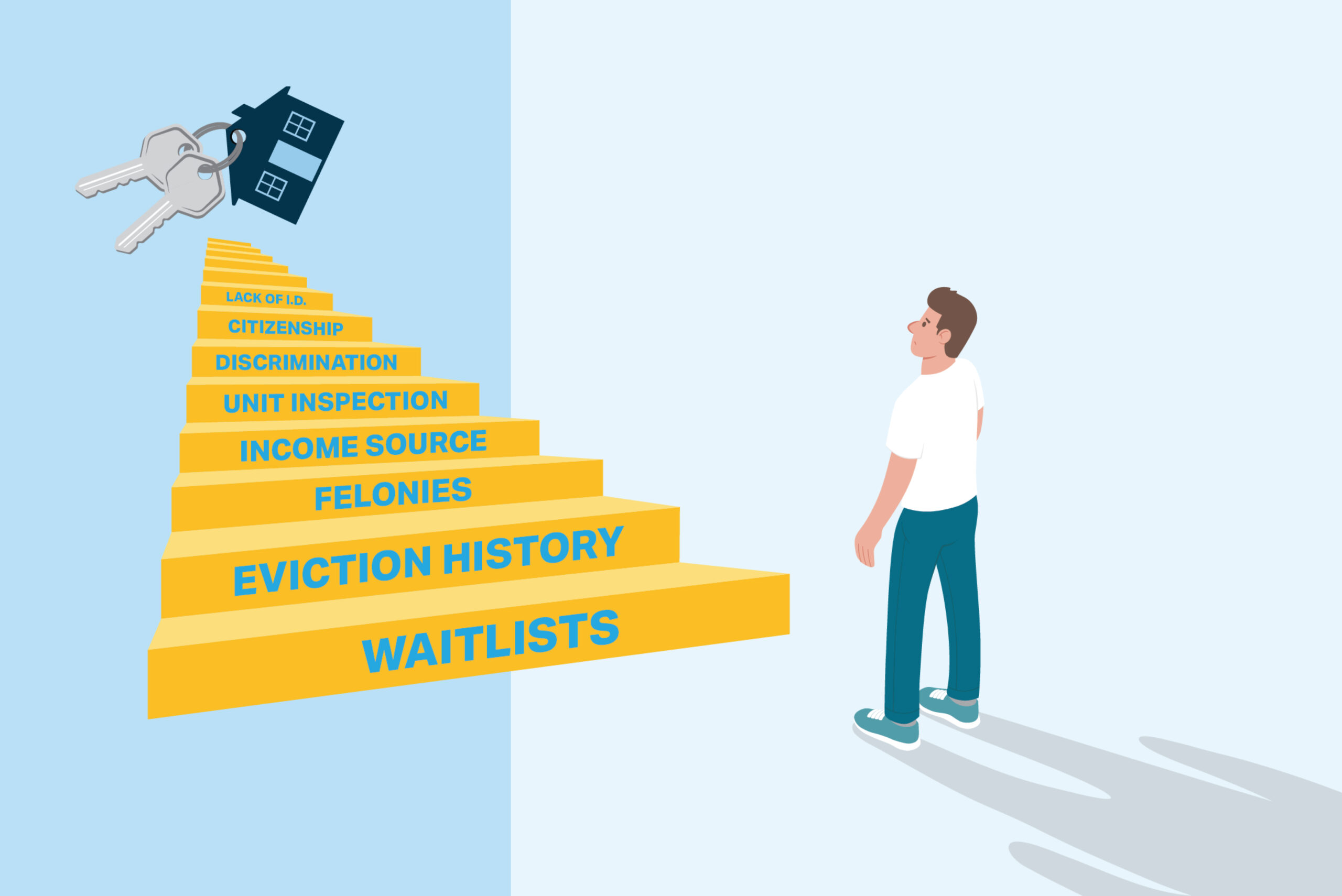How Will the Coronavirus Affect Homelessness?
July 21, 2020
Earlier this year the National Alliance to End Homelessness released its 2020 State of Homelessness, an annual report that evaluates the nation’s progress towards ending homelessness. The report reveals that homelessness increased by 3 percent over the previous year, marking the third straight year of national-level increases. Despite this negative movement, the long-term trend has been downward. Overall homelessness has decreased by 12 percent since 2007, the year nation-wide data collection began. That said, the current COVID-19 crisis has the potential to diminish or completely wipe out these modest gains.
The 2020 State of Homelessness report was created based on data collected prior to the start of COVID-19, and it offers both a baseline of where homelessness existed prior to the pandemic as well as some clues as to how the coronavirus may affect people who are experiencing homelessness.
How COVID will Affect People Experiencing Homelessness
Subpopulations at Greater Risk
We already know that some populations are more vulnerable to the coronavirus, from the perspectives of both being able to contract the virus to their ability to fight the virus after they’re diagnosed. People who are experiencing homelessness have the potential to fall into both of these groups.
This is first because people who are facing homelessness often live in close proximity to one another, are more transient than other members of the general population, and often lack access to basic hygiene. All of these factors increase the likelihood that a person experiencing homelessness will come into contact with COVID-19 or someone who is carrying the virus. After coming into contact with the virus, people who are experiencing homelessness are also more likely to suffer from the virus. As a result of limited healthcare, people experiencing homelessness have an inherently suppressed immune system and often suffer from serious chronic medical conditions such as heart disease, diabetes, or lung disease.
We also know that senior citizens generally are an especially vulnerable to COVID-19. Given that an estimated 202,623 single adults experiencing homelessness are over age 50, there is a significant chance that these people could become seriously ill as a result of contracting the virus.
Increased Emphasis on Personal Shelter
At the start of the pandemic, cities, counties, and states across the nation put an emphasis on social distancing, ordering many of their citizens to shelter in place to avoid interaction with others who may be carrying the virus. And while many people have the privilege to limit their exposure to the virus by isolating themselves at home, people experiencing homelessness don’t have that luxury – and are perhaps the most vulnerable to the virus.
In the era of COVID-19, elected officials and nonprofit service providers have started to reconsider congregate shelters as an emergency shelter solution, where dozens or even hundreds of people experiencing homelessness are sheltered under a shared roof. In fact, the ACLU of South California has recently called congregate shelters “frighteningly efficient modes of transmission of the virus,” referencing that “they cram large numbers of people together in warehouse-like — and often unsanitary — conditions.”
Risk Will Vary by Region
Just as rates of people experiencing homelessness varies from one region to the next, rates of people who are impacted by the coronavirus within this subpopulation will also vary by region. According to the National Alliance to End Homelessness, “recent research predicts that the number of COVID-19 cases will rise among people experiencing homelessness in the nation’s counties.” The report published by the National Alliance to End Homelessness identifies the nation’s largest cities as those facing the greatest challenges in containing the spread of coronavirus among their residents without homes: Los Angeles, New York City, San Jose, Seattle, Oakland, San Francisco, Las Vegas, and Phoenix.

SOURCE: National Alliance to End Homelessness
Rates of Homelessness Will Increase
A recent report from UCLA’s Luskin Institute on Inequality and Democracy predicts that homelessness will increase dramatically following a surge in evictions, as housed citizens across the nation suffer financial hardship and lose their ability to stay current on rent and mortgage payments. The report illustrates that the system for providing aid to people experiencing homelessness “will clearly not suffice to meet the swell in evictions and homelessness that is about to arrive in the wake of the COVID-19 emergency,” as new people pour into the pool of citizens who are experiencing homelessness.
Furthermore, the report goes on to warn that “a familiar combination of housing models and policies have already proven insufficient to meet housing need,” even prior to the threat of COVID-19.
A New Approach is Needed
UCLA’s Luskin Institute reports that “new models of housing provision are urgently needed to meet these targets and the full span of housing need.” Prior to the pandemic cities, counties, and states across the nation were aware of rising rates of homelessness, and COVID-19 will only increase the rate at which people enter homelessness if no action is taken.
Innovative shelter offerings that prioritize personal space and sanitation, such as Pallet’s personal shelters, are urgently needed to allow people experiencing homelessness the ability to evade the virus. In addition to granting residents the ability to practice social distancing, person shelters are more dignified than sleeping on the street or in a congregate shelter — and with Pallet’s rapid, scalable, and cost-effective shelters, personal shelter is within reach for thousands of Americans experiencing homelessness.



